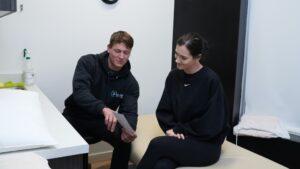
Postpartum or postnatal physiotherapy treats women after giving birth. Having a baby affects the mother physically, emotionally, and mentally. In the early days and weeks after giving birth, a woman’s body goes through a lot of changes affecting bladder, vagina, breasts, core, and postural muscles. Having pain, bleeding, constipation, incontinence, and organ prolapse are common complaints of women after giving birth.
Several conditions that many women face postpartum can be treated or managed by a pelvic health physiotherapist.
When should a woman seek Postnatal physiotherapy?
Prenatal physiotherapy consultations can begin at any time during a pregnancy. Most women come to our clinics when pain and issues arise. That may be as early as 10 or 11 weeks into the pregnancy. Other women may make it to the 31- or 32-week mark before any problems occur. We often see active women or athletes come in early so we can plan together and develop strategies for return to activity after birth.
What happens to the pelvis and pelvic floor during pregnancy?
During a pregnancy, the ligaments and joints loosen, allowing the pelvis to expand in preparation for delivery. This unlocks the pelvis and creates more movement than usual which is often the cause of most patients lower back or pelvic pain.
The pelvic floor is always loaded against gravity when we’re standing and moving. With the extra weight of carrying a baby, additional pressure is drawn down through the pelvic floor.
This is why pelvic floor strengthening is essential for all women, regardless of how you’re delivering, whether it be through C-Section or vaginally. Either way, you had the pressure of a baby loading your pelvic floor for nine months.
What conditions can be treated?
Prenatal: Reduce discomfort and pain without resorting to medication. Physiotherapy before pregnancy can make delivery safer and aid recovery postpartum.
- Pregnancy related pelvic girdle pain
- Joint pain
- Numb, tingling, or pain in hands and fingers
- Swollen ankles and varicose veins
- Chronic back and/or pelvic pain
- Incontinence
Postnatal: Treat pregnancy-related issues and improve postnatal recovery with a licensed physiotherapist. Pain does not have to be part of the process.
- Urinary incontinence
- Low back pain
- Diastasis recti
- Pelvic organ prolapse
- Pelvic floor muscle or ligamentous injury due to delivery
- Pelvic girdle pain
- Pain or adhesions following abdominal or pelvic surgery

Your individualized treatment plan may include:
- Full body assessment and treatment
- Internal pelvic floor manual therapy
- Postural correction
- Pelvic floor function/retraining
- Muscle release and retraining
- External manual therapy
- Craniosacral therapy
- Kinesiotape
- Education
- A home exercise program tailored to your goals
How can postnatal physiotherapy support a faster return to normal activities?
Regular sessions with your physiotherapist can help your body to get back to where it was before pregnancy. Postnatal physiotherapy can guide the return to exercise, which is different for everyone, depending on their previous level of activity.
It’s a good idea to see a Physiotherapist 6-8 weeks after birth for a postnatal check. At this time, we can assess and help you understand what’s happening with your pelvic floor and then develop a plan to return to exercise. If your pelvic floor hasn’t regained full strength and you start running, it can make things worse.
Is Physiotherapy During Pregnancy Safe?
The short answer? Yes! You can receive pelvic floor physiotherapy safely during pregnancy. In fact, it is a great way to mitigate pain and keep your body healthy throughout this time. Make sure you tell your physiotherapist about any underlying conditions or special precautions prescribed by your OBGYN.

Conclusion
You and your baby’s safety are always our priority. That’s why it is so vital to work with someone who has the proper qualifications and experience.
If you are looking to prevent and treat prenatal or postnatal pain, physiotherapy is a great solution. Whatever your needs and whatever your pace, our therapists at Synergy Rehab are happy to work with you to make your pregnancy as happy and comfortable as it should be!
Book a consultation with one of our therapists today if you have more questions about physiotherapy during your pregnancy.







